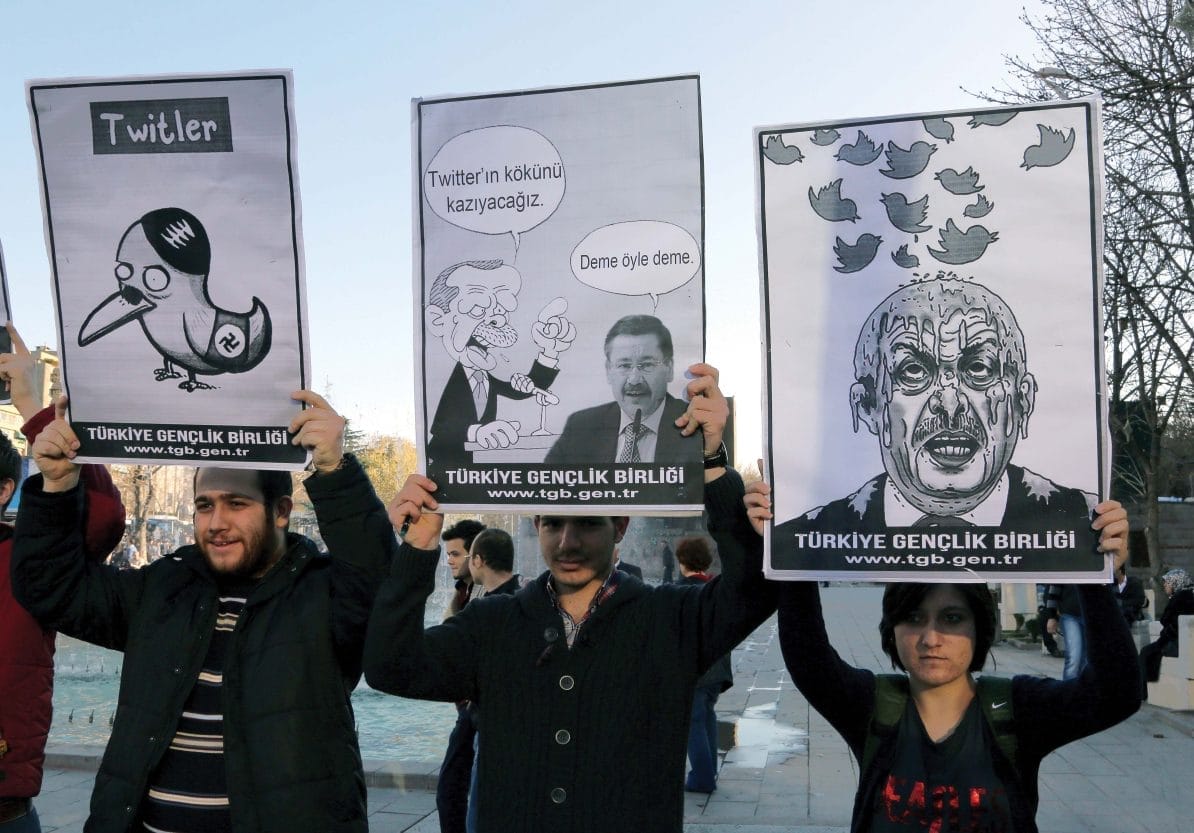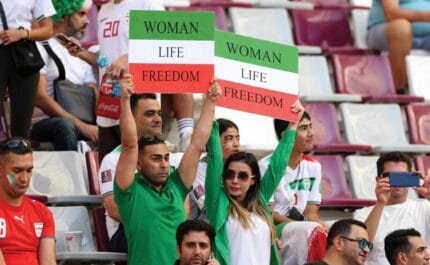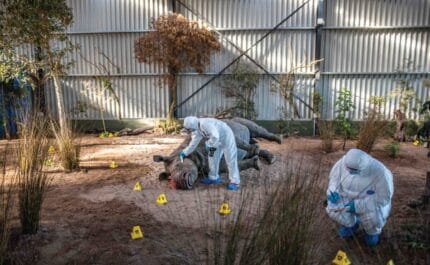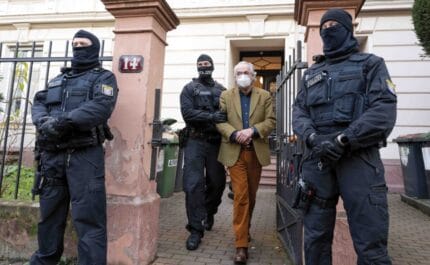Moment that mattered: Twitter is blocked in Turkey
In March 2014 we spoke to author Elif Şafak about why social media has become so politicised in her home country

Members of the Turkish Youth Union hold cartoons depicting Turkey's prime minister Recep Tayyip Erdogan during a protest against a ban on Twitter, in Ankara, Turkey, 21st March 2014. Photo: Burhan Ozbilici/AP/Press Association Images
20th March 2014 (Taken from: #14)
This article was published in Delayed Gratification in March 2014
“Since the government banned Twitter I have been tweeting more than ever: it has suddenly become all the more important.
“After the ban the number of tweets sent from Turkey went up 138 percent. Clearly blocking a site is unworkable, and the courts lifted the ban two weeks later, but the fact that it was still implemented in Turkey is alarming. It is a direct violation of freedom of speech.
“It is surprising that the prime minister, Recep Tayyip Erdogan, took such a disproportionate step, even though he knew that both the international community and the democratic forces within Turkey would be appalled. But he has his own electoral base and that’s what matters to him. Erdogan used to say, ‘I am the prime minister of everyone, whether they have voted for me or not.’ Now he behaves and talks as if the half of society that has not voted for him has no value in his eyes. As a result more and more people feel estranged, belittled, distanced.
The problem is that social media, just like the moon, has a bright side and a dark side”
“Social media became widely politicised in Turkey over the past year and one big reason for this is the visible decrease in freedom of the press and diversity in the media. Both the written and visual media in Turkey have become very divided. Many critically minded journalists have lost their jobs and as a result people began to look at social media as an alternative source of information. Where there is little press freedom, it is inevitable that social media will become more politicised. The problem is that social media, just like the moon, has a bright side and a dark side. On the bright side, it is an egalitarian platform that connects human beings regardless of location, class, religion or race. On the dark side, it is open to misinformation, slander and hate. This is what the government fails to see. Exerting control over the media only serves to create a more contentious and aggressive social media.
“I think it was very important that president Abdullah Gül criticised the ban openly and the fact that he did this on Twitter spoke volumes. However, I wish he had refrained from signing the new internet law that gave the government far more control and authority over social media.
“Despite Twitter usage going up, the move did not quite backfire, I’m afraid. We need to take a closer look at the people who repeatedly and doggedly vote for Erdogan’s AKP [The Justice and Development Party, who have a two-thirds majority in parliament] despite all the corruption scandals and internet bans. Most of these people are not Twitter users. Prior to the local elections on 30th March the AKP’s campaign was based on an “us versus them” distinction. It didn’t feel like local elections. It felt like war. AKP constantly referred to the War of Independence [the post WWI conflict between Turkish nationalists and the occupying Allies], saying we were surrounded by enemies. This kind of rhetoric is very dangerous, but it worked with their own electoral base. They have consolidated their vote at the expense of a more divided Turkey.
Of course this isn’t just about Twitter. In Turkey today there are major obstacles in front of freedom of expression, freedom of humour and freedom of the press. Words are heavy in my country. Every writer, poet and journalist knows this truth in his bones. There are laws in our constitution that can potentially get you in trouble for writing a book, a novel, an article or even a tweet [in 2006 Şafak faced charges for “insulting Turkishness” – the case was later dismissed]. The threat hangs over our heads like the Sword of Damocles. We don’t know if or when we’ll be sued for our words. We rarely talk about self-censorship but it is a reality.
Today we are divided like never before. There are cultural ghettoes, surrounded with invisible walls of prejudice. AKP followers and AKP critics became equally suspicious of each other. There are only three areas left in Turkey where you can still see people from different backgrounds getting together: art, literature and football. The social and political role of literature has oddly increased at these times of estrangement and paranoia.
The Twitter ban hugely damaged Turkey’s reputation around the world, and not only in the eyes of the Western world. Many people from the Middle East, Pakistan and from within the Muslim world used to see Turkey in a different light. Until recently it was regarded as almost a role model, as an important country where Western democracy, secularism, modernity and Muslim culture successfully mingled. That is not the perception any more.
Slow Journalism in your inbox, plus infographics, offers and more: sign up for the free DG newsletter. Sign me up
Thanks for signing up.








